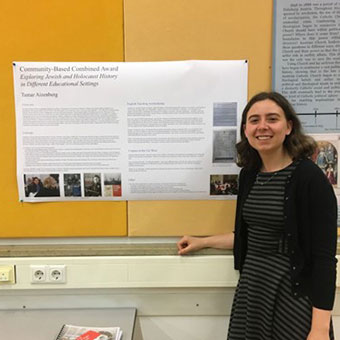Tamar Aizenberg
 Tamar Aizenberg at the 2019 Fulbright symposium in Strobl am Wolfgangsee, Austria
Tamar Aizenberg at the 2019 Fulbright symposium in Strobl am Wolfgangsee, Austria
- PhD student, 3rd year
- Graduate program: Jewish Studies
Spotlight Interview
The responses have been edited for clarity and length.
URCC: Did you participate in undergraduate research as an undergraduate? How did you find your undergraduate research project?
Tamar: I initially participated in chemistry research as an undergraduate and then shifted to participating in history research as my career plans changed. I worked in chemistry labs at Northwestern University for two summers. The first summer, I used computational chemistry methods to study dental materials, and the second summer, I participated in a project examining metal-halide perovskites, which are materials used in solar cells. After I shifted to studying history, I decided to focus my research on the grandchildren of Holocaust survivors and Jewish identity. This topic was inspired by my semester abroad spent studying Jewish Studies in Prague and courses I took at my home institution, Williams College, on archival methods, the meaning of the Jewish diaspora, and Holocaust memory. For the summer before my senior year, I received a fellowship that allowed me to attend a weeklong oral history seminar and then interviewed about 30 grandchildren of survivors, mainly in New York and Chicago. These interviews were the basis for my yearlong senior thesis, in which I examined the nature of grandchildren of survivors’ collectivity as well as their relationship to Jewish religious practice and Jewish history.
URCC: Who were your undergraduate research mentors and how did they advise you? How did this experience affect your current academic and research path?
Tamar: I had great undergraduate research mentors in the History department at Williams College. While at Williams, they advised me on what courses to take for my History major, how to write a research proposal, how to structure a longer piece of writing like a thesis, and how to think through challenging concepts that came up in my research. I applied to graduate school one year after I graduated from Williams, and these mentors were also people I turned to when deciding what graduate programs to apply to and how to properly and effectively write a graduate school application.
URCC: What advice can you give to undergraduates who want to enter a research- and teaching-focused PhD?
Tamar: I would suggest taking advantage of opportunities to explore different topics that you might be interested in — whether these are different topics within the same discipline or topics in different disciplines — to determine what kind of research and teaching you want to pursue. I would also advise that even as you zero in on specific topics of interest, to keep in mind the bigger questions about your research so that you can relate it to the research of your peers and mentors.
URCC: What is your focus of your current research? What research or creative questions are you exploring? How have you partnered with undergraduates on this or other projects?
Tamar: My research focuses on the grandchildren of Holocaust survivors and the grandchildren of Holocaust perpetrators. I study the transmission of the memory of the Holocaust from survivors to their grandchildren and the transmission of the memory of the Third Reich from perpetrators to their grandchildren. I’m also interested in comparing these two forms of transmission to examine if there are any similarities between how each set of grandchildren learns about and processes their family history.
To do so, I am exploring questions such as: How does the retelling of the past by grandchildren compare to that of their grandparents? In what ways do their retellings overlap and in what ways are they different? What is the significance of these overlaps and differences? On a broader scale, what can this comparison tell us about the future of Holocaust remembrance or the future of genocide prevention?
URCC: What lessons have you learned by serving as a URCC Graduate Peer Research Mentor?
Tamar: I’ve learned three main lessons as a URCC Graduate Peer Research Mentor. First, that it’s helpful for undergraduates to have access to a less formal mentoring network — by that, I mean mentors who are not their official supervisors. This gives them a chance to ask questions that are very important for getting involved in research but might be difficult to ask a supervisor. Second, that many students who want to get involved in research or who are already involved in research share the same concerns, such as how to balance research with a heavy course load or how to approach a potential research mentor. And third, that it’s exciting to share my own research experiences with undergraduates both because I like discussing research and because it’s a chance to be involved in a different kind of teaching than subject-based teaching.
URCC: What actionable advice can you give for aspiring mentors?
Tamar: Before becoming a mentor, I’d suggest being sure that you know the material that is the topic of the mentoring very well so that you can transmit knowledge correctly and effectively. Along with that, I’d recommend reflecting on your own research experiences so that you can highlight the key anecdotes or pieces of advice that you’d like to pass on. Once you are a mentor, I think it’s important to develop a relationship with your mentees that’s based on mutual respect and thoughtful listening.